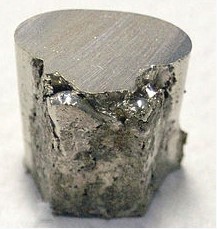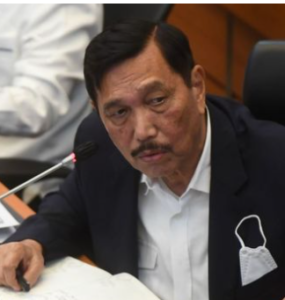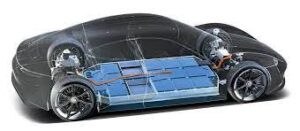
Nikel-sumber Wikipedia
STRATEGIC ASSESSMENT. Indonesia boasts the Earth’s largest reserves, making it something like the Saudi Arabia of nickel. But harvesting and refining those stocks is largely dependent on investment and technology from Chinese companies. And that has limited Indonesia’s access to the United States.
In recent months, Luhut has implored the Biden administration for a trade deal covering minerals in an effort to secure his country status as a friendly country, but has been repeatedly rebuffed because of U.S. concerns about Chinese investment in Indonesia’s nickel industry, as well as unease over working conditions and environmental standards. Some within the Biden administration argue that this stance is short-sighted.

Nickel is a central component of the transition away from fossil fuels, making access to Indonesia’s stocks an objective of greatest urgency. But powerful administration figures — especially on the National Security Council — maintain that nothing should be subordinated to limiting China’s might… “America doesn’t understand what Indonesia is doing,” Luhut said. “It’s frustrating.”
Maritime Affairs and Investment Coordinating Minister Luhut Binsar Pandjaitan said that funding for early retirement for coal-fired power plants from the Just Energy Transition Partnership (JETP) is still unclear. In fact, the government has prepared a number of steam power plants that are ready to be retired more quickly into the JETP program.
It is planned that the pool of funds will be used to finance the coal-fired power plant early retirement program and the construction of new renewable energy-based power plants in the future. Luhut revealed that negotiations on a climate pact led by the United States and Japan and other partners continue today. He said the commitment for the transitional fund of US$20 billion, equivalent to Rp.310.7 trillion (assuming an exchange rate of Rp.15,535 per US$) from the climate pact, was not clear. “The report showed that we were the ones who postponed it, while there was no clarity from the IPG,” he said.

Energy and Mineral Resources Minister special staff Irwandy Arif admitted that the majority of nickel downstream in Indonesia came from Chinese companies. He said that currently 90 percent of nickel smelters in Indonesia use pyrometallurgical or rotary kiln electric furnace (RKEF) technology originating from China. This is due to the fact that China offers cheaper investment opportunities for processing technologies that produce second-rate nickel products in the form of nickel pig iron (NPI) and ferronickel.
The Energy and Mineral Resources Ministry is open to nickel explorations in greenfield sites. Ministry special advisor Irwandy Arif said several companies have expressed their interest in such projects. Currently, the ministry’s Geological Agency is looking for potential nickel reserves in greenfield areas in Papua, Kalimantan, and Sumatra.
However, nickel resources in these areas are not as large as in Sulawesi and Maluku. The ministry revealed that Indonesia’s total reserves of high-grade nickel ores or saprolites with nickel (Ni) contents of more than 1.7 percent and 1.5 percent are 1.76 and 2.75 billion tons, respectively.
The Just Energy Transition Partnership (JETP) Secretariat officially submitted the comprehensive investment and policy plan (CIPP) to the Indonesian government and partners on Wednesday. Energy and Mineral Resources Ministry Secretary-General Dadan Kusdiana said the Indonesian people would get the opportunity to review the CIPP document in its entirety and provide input and responses for consideration in the final revision of the CIPP document.
Representing the United States co-leadership in the International Partners Group (IPG), U.S. Ambassador to Indonesia Sung Y. Kim said Indonesia deserves a bright future with clean air and green jobs. He said that JETP is starting Indonesia’s green economic future while protecting communities and workers, which will have long-lasting benefits for all Indonesians.
The Just Energy Transition Partnership (JETP) Secretariat, tasked with overseeing the implementation of Indonesia’s $20 billion JETP, has pushed back the launch of its much-anticipated investment plan to “later this year.” A statement from the office released cites a need for more time to devise “a technically credible pathway for Indonesia’s power sector transition” as a reason for the delay. The final Comprehensive Investment and Policy Plan (CIPP), which underpins the landmark climate financing deal signed at the G20 Bali Summit last year, was expected to be unveiled on Wednesday. Delaying its launch, according to Energy and Mineral Resources Ministry Secretary-General Dadan Kusdiana, would also allow for a period of robust public consultation before the CIPP was finalized.

For most of his 57 years on the island of Sulawesi, Jamal was accustomed to scarcity, modest expectations and a grim shortage of jobs. People mined sand, caught fish and coaxed crops from the soil. Chickens frequently disappeared from front yards, stolen by hungry neighbors. Then, six years ago, a towering smelter rose next to his home. The factory was built by a company called PT Dragon Virtue Nickel Industry, a subsidiary of a Chinese mining giant, Jiangsu Delong Nickel. The park was officially created in 2013 through an agreement announced by Indonesia’s then-president, Susilo Bambang Yudhoyono, and President Xi Jinping of China. China Development Bank provided a loan of more than $1.2 billion.
Indonesia is one of the countries that agreed to receive energy transition funds through the Just Energy Transition Partnership (JETP), worth of $20 billion (around IDR306.5 trillion) in the next two to three years, or 2025. “To be able to finance the entire energy transition in Indonesia until it reaches net zero will be greater, even many times over $20 billion,” said energy policy analyst Anissa Suharsono at the Indonesia Cerah Foundation Expert Panel event in Jakarta.
Major Chinese nickel maker Tsingshan Group has started commercial production of refined nickel in Indonesia, three sources familiar with the production told Reuters. The plant, based in Morowali in Indonesia with an ultimate planned annual capacity of 50,000 metric tons, started commercial production last week, the sources said, declining to be named as they are not authorised to speak to the media.
Southeast Asia’s largest economy needs to devise a strategy to cap annual carbon emissions from the power sector at 290 million tons, a figure set as a requirement for accessing US$20 billion through the Just Energy Transition Partnership (JETP). Bhima Yudhistira, director of the Center of Economic and Law Studies (CELIOS), said the technicalities over the peak emissions target from the power sector may be a huge hindrance to the landmark climate financing deal.
“If you look at it, the problem lies in the International Partners Group’s [IPG] conflicting interests with China in Indonesia’s energy transition, including the issue of power plants for processing critical minerals.” The JETP Secretariat, tasked with preparing the final Comprehensive Investment and Policy Plan (CIPP), has pushed back the launch of the much-anticipated investment plan to “later this year”, one of the snags in the process being the expanding electricity generation capacity from captive coal power facilities.
Just Energy Transition Partnership (JETP) Secretariat Deputy Chair Paul Butarbutar said the government needed time to negotiate the investment planning document for the JETP. Many fundamental issues need to be renegotiated, including obtaining a larger grant fund from the $20 billion funding commitment. The government had delayed the launch of the JETP Comprehensive Investment Planning and Policy Document (CIPP) from Aug. 16 to the end of 2023.
Indonesia’s energy transition funding plan of $20 billion (around IDR300 trillion) through the Just Energy Transition Partnership (JETP) is still uncertain. The JETP Secretariat revealed that Indonesia must meet several conditions to obtain this ambitious funding. “There are prerequisites that need to be met. We need to invest a lot in geothermal energy and other renewable energy, increase hydroelectric power plants, then build more than 20 Gigawatts of solar power plants and solar photovoltaics (PV),” said JETP Secretariat Deputy Paul Butarbutar.
The government has confirmed that it will immediately retire a number of coal-fired power plants, corresponding to the accumulation of investment funds for dealing with climate change. According to Finance Ministry’s Fiscal Policy Agency (BKF) Febrio Kacaribu, funds collected to date total $500 million, or IDR7.66 trillion. He said that the funds raised would be used to fund the early retirement of coal-fired power plants in a number of Indonesian regions in the near future. However, he explained, the private sector continues to face funding challenges. With a funding requirement of $281 billion, Indonesia remains committed to reducing carbon emissions.

Indonesia’s financial regulator has issued a set of rules on the setting up of a carbon exchange, aiming to launch onshore carbon trading by the end of this year. The exchange is part of efforts by Indonesia, one of the world’s biggest carbon emitters, to cut its emissions by more than 30 percent by 2030 and to achieve net-zero emissions by 2060. The exchange will be allowed to facilitate cross-border trade, according to the rule made public. The trading will use a cap-and-trade system where pollution levels are limited and allowances can be traded by business entities.
Indonesia’s talks with international partners on setting up a $20 billion fund for the country’s transition from coal to cleaner energy have taken longer than anticipated and are complicated by rising borrowing costs, its finance minister said. A coalition of countries led by the United States and Japan in November pledged to mobilise $20 billion of public and private finance to help Indonesia shut coal power plants and bring forward the sector’s peak emissions date by seven years to 2030. It was based on a similar $8.5 billion initiative in 2021 to help South Africa more quickly decarbonise its power sector.
Indonesia’s electric vehicle ambitions have seen it ramp up refining of nickel, a key component in electric vehicle (EV) batteries, at industrial estates springing up across the country. However, these smelters are powered by purpose-built coal-fired plants, which environmental activists say are causing illness, killing crops and polluting fish farms. Among the coal plants that activists say are polluting local villages are those that power the nickel smelters owned by Chinese companies PT Gunbuster Nickel Industry (GNI), PT Virtue Dragon Nickel Industry (VDNI), and PT Obsidian Stainless Steel (OSS). While Indonesia has stated its commitment to transitioning away from coal in powering its grid, these industry-exclusive “captive” plants aren’t subject to any kind of phaseout, and are in fact encouraged by regulation.

Indonesia may lack the necessary funding to complete the energy transition, putting the country at risk of missing its emission reduction targets, especially those of the next seven years. Indonesia Just Energy Transition Partnership (JETP) Secretariat deputy chair Paul Butarbutar said that as part of its emission reduction ambitions, the country requires financing to fund commercially unviable projects such as the early retirement of coal-fired power plants. So far, Indonesia has only secured $500 million from Climate Investment Funds (CIF) under the Energy Transition Mechanism (ETM) signed last year in the form of concessional funding, which the Asian Development Bank (ADB) has described as low-cost equity or debt. “Other than that, we don’t have any money left,” Paul told audiences during a side event at the ASEAN Finance Ministers and Central Bank Governors Meeting.
Deputy Secretary for the U.S. Department of Energy David Turk in a virtual press briefing said a number of issues and policy plans related to the funding for the Just Energy Transition Partnership (JETP) still need to be discussed with Indonesia. Turk also said that JETP does not only involve the U.S. government, but also other countries and partners. “I think it’s important to underscore that this is a partnership and there’s a lot of discussion back and forth,” he said. “This is also trying to think through comprehensively in terms of a comprehensive investment and policy plan.”
Energy and Mineral Resources Ministry Secretary General Dadan Kusdiana said the Just Energy Transition Partnership (JETP) funding of US$ 20 billion (IDR 300 trillion) was a combination of loans and technical assistance. He said there would be a discussion later on the JETP funding scheme’s division of grants and loans. He said the JETP funding scheme is not a model for implementing an energy transition in Indonesia. Dadan said the ministry is continuing to communicate with developed countries in order to help finance Indonesia’s energy transition, which is separate from discussions about JETP funding. Dadan previously said the portion of the grant that Indonesia received from JETP’s total funding was only $130 million or IDR1.99 trillion.
Acting Special Coordinator for the Partnership for Global Infrastructure and Investment (PGI) Helaina Matza revealed the reason for the energy transition fund or Just Energy Transition Partnership (JETP) for Indonesia worth US$20 billion (equivalent to Rp.310 trillion) has not been disbursed to date. Matza explained that the disbursement of the JETP program funds was a long and complicated process for the government of any country, especially considering Indonesia is a large and diverse country. She revealed that PGI has seen a lot of progress in energy transition commitments in Indonesia.
Helaina Matza, the U.S. Special Coordinator for the Partnership for Infrastructure and Global Investment (PGI), said that Indonesia has a great opportunity, particularly to become a major player in the global EV battery industry. According to Matza, this ambition can be realized if Indonesia does not rely solely on nickel production, but also on processing investments and relationships with automotive and battery manufacturers. She believes that Indonesia must also ensure that investors understand the “rules of the game” when they are involved in any aspect of mining operations, processing, or precursor development. Matza visited Indonesia from Aug. 22 to 28 to advance U.S. efforts to facilitate strategic infrastructure investment.
Vale Indonesia is collaborating with Zhejian Huayou Vobalt Co. Ltd (Huayou) and PT Huali Nuckel Indonesia (Huali) to build a nickel processing facility using high-pressure acid leaching (HPAL) technology. This establishes a yearly production target of 60,000 tons of nickel and 5,000 tons of cobalt in the form of mixed hydroxide precipitate (MHP) products, which can then be processed into EV batteries. According to Vale Indonesia CEO Febriany Eddy, the project will process limonite nickel ore from the Sorowako block, with the HPAL factory located in Malili, East Luwu, South Sulawesi.





